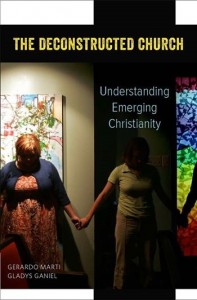 The Deconstructed Church: Understanding Emerging Christianity (Oxford 2014), which I co-authored with Gerardo Marti, has been reviewed by Josh Packard from the University of Northern Colorado in the academic journal Sociology of Religion (you can read the full review on academia.edu).
The Deconstructed Church: Understanding Emerging Christianity (Oxford 2014), which I co-authored with Gerardo Marti, has been reviewed by Josh Packard from the University of Northern Colorado in the academic journal Sociology of Religion (you can read the full review on academia.edu).
Below are some excerpts from the review.
Review of The Deconstructed Church by Josh Packard in Sociology of Religion
Marti and Ganiel have written a richly detailed and compelling account of the Emerging Church that empirically situates the movement in the broader social landscape. They make a convincing case for the Emerging Church Movement (ECM) as an orientation which will influence the religious landscape for years to come. Grounded in ethnographic and interview accounts from both the UK and the United States, they set out to articulate the forces that lead people to this distinctly modern expression of religion while simultaneously demonstrating the broad reach of these impulses as they extend beyond the ECM and even the field of religion.
Methodologically, this text stands as an example of how to empirically engage an intentionally obscure and label-defining group. Their deep and multifaceted approach to data collection yields an engaging book with rich, extended examples. It is precisely because of this methodological rigor that the text is able to provide a much better sense of the attributes and scope of the ECM than anything else in print. Thus, researchers explicitly concerned with the ECM will find much here with which to be satisfied as this work provides the most conceptually and empirically grounded understanding of the movement to date.
… However, this is not simply a text that will appeal to the relatively narrow group of scholars interested in the ECM for the sake of the ECM. Sociologists interested in the way institutions in general and religious organizations in particular are responding to and shaping the modern tensions between an individualist ethic and a desire for collective experience will be interested in this book. To this end, there are three concepts that are most helpful in the text. First, Marti and Ganiel draw extensively on Beck’s concept of cooperative egoism to set the Emerging Church apart from other religious groups. The data presented in the development of this theory generally support the existing treatments of the ECM and accurately articulate how religion can be reformulated to accommodate the seemingly contradictory impulse to be simultaneously an individual and part of a community. While this conceptual difficulty is an issue as old as the discipline, the contribution by Marti and Ganiel in this area is welcome in that their treatment explicitly privileges the lived experiences and interpretations of people in the religious sphere, an important area that has been long neglected. Secondly, the development of the concept of collective institutional entrepreneurship is of utmost importance for understanding how organizations can operate and even thrive with anti-institutionalist orientations. While this concept is grounded in their data, it has implications far beyond the ECM if we think that the same social factors driving people to these kinds of religious organizations are present in other areas of contemporary society. Finally, Marti and Ganiel do a convincing job of expanding the map with regard to who is participating in the ECM and how much staying power the movement has. They smartly situate the movement as tapping into broader social forces by pointing out that while labels might change, this religious orientation is here to stay. In doing so, they make this argument relevant for the broader field of sociology of religion by providing a strong picture of what the future of religion will likely hold.
… Moving forward, sociologists will look to The Deconstructed Church as a jumping off place to access these more narrowly specified works as Marti and Ganiel’s book will set the tone for future studies of the ECM for years to come.
I sense that the book is written in plainer English than this review! I’ll refer him to the campaign for plain English! Norman Hamilton
My sentiments too!
Dennis Golden